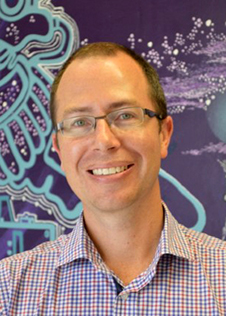Wednesday 14 July 2021 2:51pm
Associate Professor Ben Wheeler, EDOR member and paediatric endocrinologist, and visiting clinician Dr Shekhar Sehgal, are working with an artificial pancreas system that can automatically deliver insulin to those with diabetes.
The artificial pancreas clinical work, currently being carried out by Associate Professor Wheeler's and Dr Martin De Bock's research teams, has been reported in the Otago Daily Times this week, as iterations are trialled by those living with diabetes in Canterbury and Otago.
Dr Shekhar Sehgal, a clinician on secondment for a year from the Hawke's Bay, is working with Associate Professor Wheeler on refining a commonly used insulin pump system so that it more closely mimics a pancreas. The system, produced by a leading commercial company in this field, contains an advanced algorithm which the pump uses to predict blood glucose trends. The pump then automatically administers insulin based on the user's predicted needs, rather than the user needing to make these adjustments manually.
Associate Professor Wheeler says that "this device is the future gold standard for diabetes management".
"It's a bit like a self-driving car. It has a brain inside the pump and takes all the sensor information and makes its own decisions independent of us."
Dr Sehgal is also working with advanced diabetes technology to investigate links to a smart watch, for less conspicuous and reduced burden glucose monitoring.
View the news article
Researchers at Otago work on 'artificial' pancreas, ODT, 14 July, 2021
Read more about this research group
- Thousands call for Government to better fund diabetes monitoring devices, Stuff, 30 June, 2021
- Diabetes study furthers work on 'artificial pancreas', University of Otago, 4 March, 2021
- Pioneering better tools for managing type 1 diabetes, EDOR, 26 November, 2020
- Freemasons Fellowship for glucose monitoring research in children with diabetes, EDOR, 22 October, 2020
- New tech sees teens with diabetes improve glucose monitoring, but not control, University of Otago, 7 October, 2020
